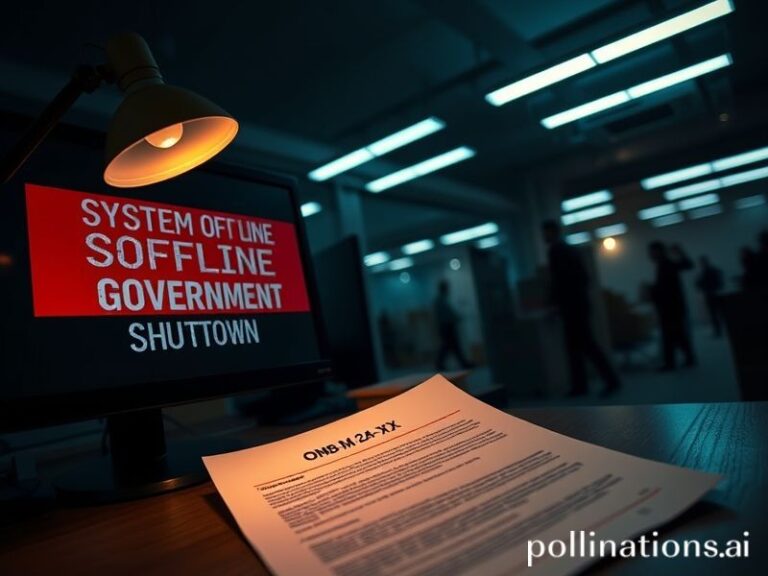Global Panic in Pearls: How Desperate Housewives Became the Canary in the World’s Coal Mine
THE PANIC ROOMS OF SUBURBIA HAVE GLOBAL COUNTERPARTS—AND THEY’RE ALL RUNNING OUT OF WINE
From the manicured cul-de-sacs of Westchester to the pastel high-rises of Singapore’s River Valley, a peculiar species is pacing: the Desperate Housewife, now upgraded to Version 2.0 with Wi-Fi, a side hustle, and a creeping sense that the planet is on fire. Once a purely American sitcom trope—complete with apple-pie arsenic and synchronized gardening—she has metastasized into a worldwide archetype, trading casserole recipes for crypto tips and swapping PTA gossip for climate-anxiety group chats. The phenomenon is no longer confined to ABC’s backlot; it is a geopolitical indicator light, flashing amber on every continent where property values outrun purpose.
Take Karina, 42, in Warsaw’s Wilanów district. By day she curates Instagram flat-lays of gluten-free pierogi; by night she doom-scrolls grain-export spreadsheets, wondering whether her husband’s logistics firm will be collateral damage in the next sanctions package. In Lagos, Mrs. Adeyemi juggles three generators, a WhatsApp pyramid scheme, and a husband who keeps “traveling for business” while the naira hyperventilates. Meanwhile, in Shanghai’s gilded Pudong cages, “full-time mothers” binge Korean skincare tutorials and silently calculate how many social-credit points a child’s violin recital is worth. Different accents, same soundtrack: the low hum of existential dread.
Globalization promised liberation but delivered comparison culture in 4K. When a mother in Helsinki livestreams her hygge-themed birthday party, a mother in Guadalajara feels her own paletas-and-piñata effort shrivel into inadequacy. The algorithm doesn’t care about purchasing-power parity; it cares about engagement. Thus, the Desperate Housewife becomes an unwitting foot soldier in the attention economy, staging ever-more baroque rituals of domestic perfection to keep the brand partnerships flowing. If the 1950s version fretted about keeping up with the Joneses, the 2020s model must keep up with the entire planet, one filtered sunrise at a time.
Governments, bless their bumbling hearts, have noticed. South Korea’s finance ministry recently floated a “Mom-Fluencer Grant” to boost birth rates—subsidized ring lights in exchange for pro-natal vlogs. Italy’s far-right coalition proposes tax breaks for women who post three home-cooked meals a week under the hashtag #TradizioneVita. In Russia, state media celebrates “hero mothers” who manage both trench-widow stoicism and sourdough mastery. The subtext is unmissable: if we can’t fix structural inequality, at least we can monetize the coping mechanisms.
Meanwhile, the supply chains that underpin this theater of domesticity wobble like a soufflé in a hurricane. Sri Lankan tea pickers strike for wages that would barely cover one artisanal matcha latte in Brentwood. Vietnamese garment workers stitch loungewear destined for suburban closets, praying the next factory fire isn’t theirs. The carbon footprint of a single “self-care Sunday” could power a midsize village, but the guilt is outsourced along with the labor. Desperation, it turns out, is carbon-intensive.
And yet, for all the bleak metrics, the International Desperate Housewife endures, adapting like a cockroach in Louboutins. In Kyiv, air-raid sirens interrupt Zoom Pilates, so the class simply relocates to the bomb shelter—downward dog beside sacks of potatoes. In Tehran, mandatory hijab laws spawn an underground scene of private wine-and-design nights, where the chadors come off and the Shiraz flows like contraband hope. Even in Kabul, under Taliban rule, secret TikTok accounts pop up showing how to contour under a niqab. Oppression rarely kills vanity; it merely raises the stakes.
The broader significance? The Desperate Housewife is no longer a person so much as a pressure gauge. When she starts Googling “how to disappear completely,” central banks should worry; when she pivots to homesteading and bulk toilet-paper acquisition, defense ministries should update their threat matrices. Her frenzy is the canary in the global coal mine, tweeting (sometimes literally) that the old social contracts—marry, mortgage, manicure—are expiring faster than last season’s sourdough starter.
So pity her, envy her, or simply mute her; just don’t underestimate her. Somewhere between the school-run Land Rover and the collapsing ice shelf, she has become the world’s most reliable leading indicator of systemic meltdown. And right now, she’s out of rosé.







